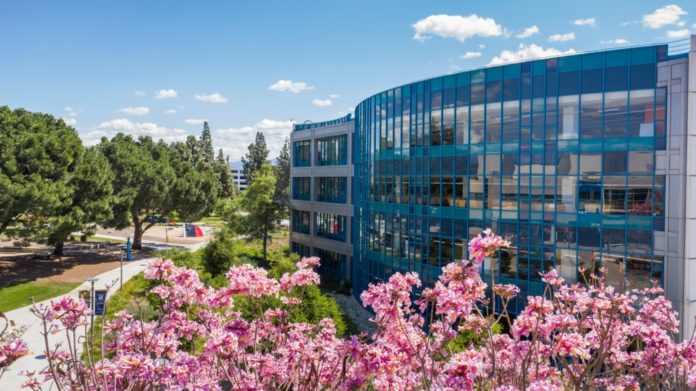By Nicole Gregory, contributing writer
The pandemic may have stalled some establishments, but not Cal State Fullerton’s Pollak Library. In the last year, renovations were completed, special collections were added and accessibility to the library’s resources increased rapidly so that students could continue to do their research without interruption.
The most obvious development is more space opened to accommodate users of the library who needed to be distanced. “We’ve added about 350 seats,” said Emily Bonney, dean of the library and professor of liberal studies. Renovations of the fourth and fifth floors were completed during the pandemic.
And students now can access more resources digitally than ever before.
“During the pandemic, we’ve really increased our electronic resources,” Bonney said. “We dramatically increased the number of database collections of electronic material, such as archival resources like newspaper collections. This digitization work increased the amount of materials that are now available digitally.”
The library also increased electronic resources available through the learning management system by digitizing in order to respect copyright laws.
At the same time, Pollak Library’s Special Collections have grown. “We’ve come out of the pandemic with a really enhanced collection supported by $250,000 worth of archival and newspaper materials related to ethnic studies from the College of Humanities and Social Sciences,” Bonney said.
Materials include 9,000 editions of American Indian newspapers, created by indigenous peoples in the U.S. and Canada between 1828 to 2016; the digital archive of Rafu Shimpo, the longest-running Japanese-American newspaper, which was printed in Los Angeles; and the largest compilation of 19th- and 20th-century Spanish language newspapers printed in the United States.
Enhancing the Special Collections is a goal of the Patrons of the Library, a group formed in 1972, said Joyce Mason. She has been on the board for more than 20 years at the invitation of Paulina June Pollak. Pollak and her husband, George, donated $1 million to the library in 1998, which led to naming the library in their honor.
The approximate 200 members of the Patrons have steadily enriched the library’s resources. For many years the group raised money to buy books the librarians identified as worthy, spending about $10,000 to $15,000 each year. “Recently, Patrons of the Library has changed its emphasis to augmenting the library’s Special Collections, feeling that a greater and more lasting impact can be made there,” Mason said.
The library’s Special Collections includes a trove of ancient maps. Inspired by the enthusiasm of Ernest Toy, the library’s first librarian, Roy Boswell, who had a collection of rare and antique maps, added to his collection and then donated the entire collection to the library. Some of the maps date back to the 16th century and show California as an island, Mason said. “It is now an amazing collection.”
Original typed manuscripts by famous science fiction writers are also part of the collections. “Emeritus professor Willis McNelly helped the library obtain the typescripts of books by Ray Bradbury, Philip K. Dick and Frank Herbert, the author of ‘Dune’, published in 1965 and the bestselling science fiction novel ever,” said Mason. A movie based on the book starring Timothée Chalamet is scheduled for release this month.
There is also an extensive collection of fly-fishing materials and items called the Kerridge Angling Collection, and volumes of theater history and costumes obtained with the help of James Young, chair of the CSUF drama department.
Students returning to the library will again be treated to exhibits on display, many of which were postponed due to COVID-19. The season of exhibits begins with Banned Book week and will continue throughout the year.
Bonney and her staff worked hard to maintain the library as a vital source in the last year. “I couldn’t be happier with the way our librarians have stepped up to begin providing services. They were quick to pivot during the pandemic so that students could continue to access the resources they needed,” she said.
Lockers were placed outside the library through which students could pick up books they reserved online. “We were one of the earliest campuses to respond to the needs created by the pandemic. Students go online to reserve a book with their ID. The librarian puts it in a locker, and when the student comes and puts in their code, the locker pops open and they take the book out. It’s a great system. We were running full capacity during the pandemic, and we will keep using these lockers,” Bonney said.
The library has adapted to the new reality of virtual classes by providing special seating so students can attend Zoom meetings and classes in privacy.
“This is a place where anyone can come and use the resources, it doesn’t matter your income or who you are,” Bonney said. “The library welcomes everyone and the students know that. They’ve missed it, and they have flocked back.”
Community archive seeks submissions
Pollak Library’s University Archive and Special Collections has organized Titans Remember: A Community Archive to preserve the responses to the COVID-19 pandemic. Titans can participate in the co-creation of the collection by submitting a story about life during COVID-19. Narratives, poems, songs and digital or physical creations are all welcomed. For information visit the website.
Credit: Source link































